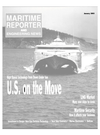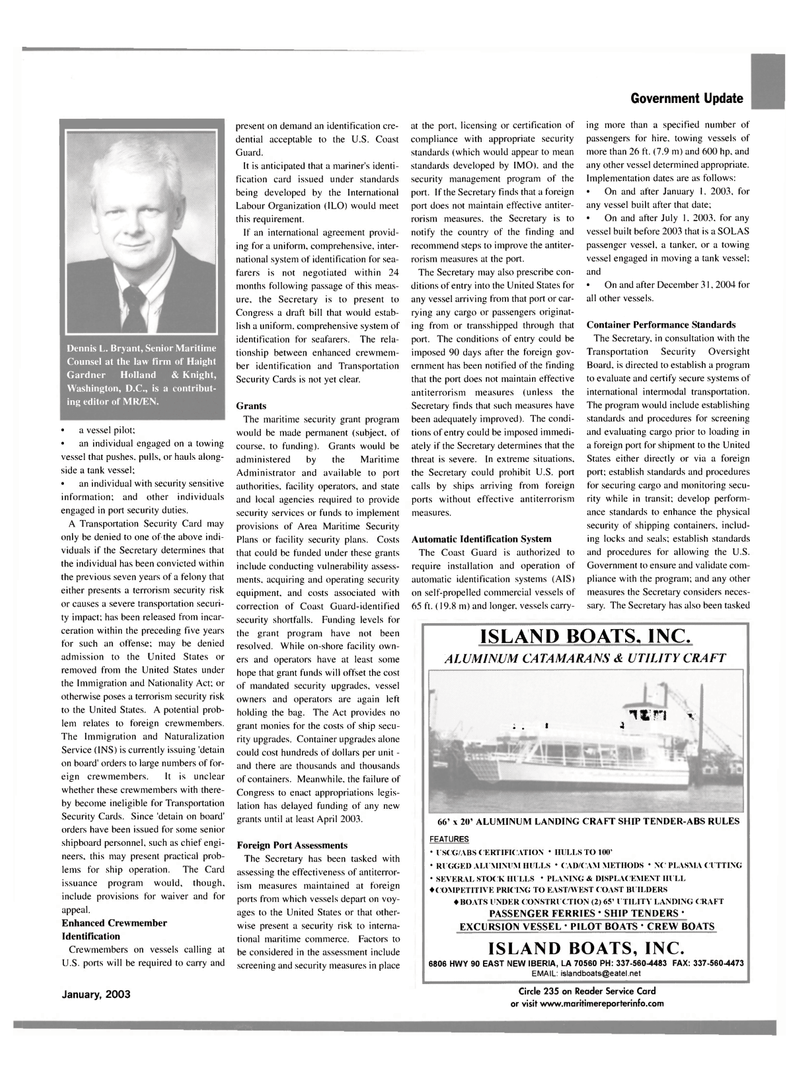
Page 21: of Maritime Reporter Magazine (January 2003)
Read this page in Pdf, Flash or Html5 edition of January 2003 Maritime Reporter Magazine
Government Update
Dennis L. Bryant, Senior Maritime
Counsel at the law firm of Haight
Gardner Holland & Knight,
Washington, D.C., is a contribut- ing editor of MR/EN. • a vessel pilot; • an individual engaged on a towing vessel that pushes, pulls, or hauls along- side a tank vessel; • an individual with security sensitive information; and other individuals engaged in port security duties.
A Transportation Security Card may only be denied to one of the above indi- viduals if the Secretary determines that the individual has been convicted within the previous seven years of a felony that either presents a terrorism security risk or causes a severe transportation securi- ty impact; has been released from incar- ceration within the preceding five years for such an offense; may be denied admission to the United States or removed from the United States under the Immigration and Nationality Act; or otherwise poses a terrorism security risk to the United States. A potential prob- lem relates to foreign crewmembers.
The Immigration and Naturalization
Service (INS) is currently issuing 'detain on board' orders to large numbers of for- eign crewmembers. It is unclear whether these crewmembers with there- by become ineligible for Transportation
Security Cards. Since 'detain on board' orders have been issued for some senior shipboard personnel, such as chief engi- neers, this may present practical prob- lems for ship operation. The Card issuance program would, though, include provisions for waiver and for appeal.
Enhanced Crewmember
Identification
Crewmembers on vessels calling at
U.S. ports will be required to carry and present on demand an identification cre- dential acceptable to the U.S. Coast
Guard.
It is anticipated that a mariner's identi- fication card issued under standards being developed by the International
Labour Organization (ILO) would meet this requirement.
If an international agreement provid- ing for a uniform, comprehensive, inter- national system of identification for sea- farers is not negotiated within 24 months following passage of this meas- ure, the Secretary is to present to
Congress a draft bill that would estab- lish a uniform, comprehensive system of identification for seafarers. The rela- tionship between enhanced crewmem- ber identification and Transportation
Security Cards is not yet clear.
Grants
The maritime security grant program would be made permanent (subject, of course, to funding). Grants would be administered by the Maritime
Administrator and available to port authorities, facility operators, and state and local agencies required to provide security services or funds to implement provisions of Area Maritime Security
Plans or facility security plans. Costs that could be funded under these grants include conducting vulnerability assess- ments, acquiring and operating security equipment, and costs associated with correction of Coast Guard-identified security shortfalls. Funding levels for the grant program have not been resolved. While on-shore facility own- ers and operators have at least some hope that grant funds will offset the cost of mandated security upgrades, vessel owners and operators are again left holding the bag. The Act provides no grant monies for the costs of ship secu- rity upgrades. Container upgrades alone could cost hundreds of dollars per unit - and there are thousands and thousands of containers. Meanwhile, the failure of
Congress to enact appropriations legis- lation has delayed funding of any new grants until at least April 2003.
Foreign Port Assessments
The Secretary has been tasked with assessing the effectiveness of antiterror- ism measures maintained at foreign ports from which vessels depart on voy- ages to the United States or that other- wise present a security risk to interna- tional maritime commerce. Factors to be considered in the assessment include screening and security measures in place at the port, licensing or certification of compliance with appropriate security standards (which would appear to mean standards developed by IMO). and the security management program of the port. If the Secretary finds that a foreign port does not maintain effective antiter- rorism measures, the Secretary is to notify the country of the finding and recommend steps to improve the antiter- rorism measures at the port.
The Secretary may also prescribe con- ditions of entry into the United States for any vessel arriving from that port or car- rying any cargo or passengers originat- ing from or transshipped through that port. The conditions of entry could be imposed 90 days after the foreign gov- ernment has been notified of the finding that the port does not maintain effective antiterrorism measures (unless the
Secretary finds that such measures have been adequately improved). The condi- tions of entry could be imposed immedi- ately if the Secretary determines that the threat is severe. In extreme situations, the Secretary could prohibit U.S. port calls by ships arriving from foreign ports without effective antiterrorism measures.
Automatic Identification System
The Coast Guard is authorized to require installation and operation of automatic identification systems (AIS) on self-propelled commercial vessels of 65 ft. (19.8 m) and longer, vessels carry- ing more than a specified number of passengers for hire, towing vessels of more than 26 ft. (7.9 m) and 600 hp, and any other vessel determined appropriate.
Implementation dates are as follows: • On and after January 1. 2003, for any vessel built after that date; • On and after July 1, 2003, for any vessel built before 2003 that is a SOLAS passenger vessel, a tanker, or a towing vessel engaged in moving a tank vessel; and • On and after December 31, 2004 for all other vessels.
Container Performance Standards
The Secretary, in consultation with the
Transportation Security Oversight
Board, is directed to establish a program to evaluate and certify secure systems of international intermodal transportation.
The program would include establishing standards and procedures for screening and evaluating cargo prior to loading in a foreign port for shipment to the United
States either directly or via a foreign port; establish standards and procedures for securing cargo and monitoring secu- rity while in transit; develop perform- ance standards to enhance the physical security of shipping containers, includ- ing locks and seals; establish standards and procedures for allowing the U.S.
Government to ensure and validate com- pliance with the program; and any other measures the Secretary considers neces- sary. The Secretary has also been tasked
ISLAND BOATS, INC.
ALUMINUM CATAMARANS & UTILITY CRAFT 11H v : . » 4 66' x 20' ALUMINUM LANDING CRAFT SHIP TENDER-ABS RULES
FEATURES • USCG/ABS CERTIFICATION • HULLS TO 100' • RUGGED ALUMINUM HULLS • CAD/CAM METHODS • NC PLASMA CUTTING • SEVERAL STOCK HULLS • PLANING & DISPLACEMENT HULL • COMPETITIVE PRICING TO EAST/WEST COAST BUILDERS • BOATS UNDER CONSTRUCTION (2) 65' UTILITY LANDING CRAFT
PASSENGER FERRIES • SHIP TENDERS •
EXCURSION VESSEL • PILOT BOATS • CREW BOATS
ISLAND BOATS, INC. 6806 HWY 90 EAST NEW IBERIA, LA 70560 PH: 337-560-4483 FAX: 337-560-4473
EMAIL: [email protected]
January, 2003 Circle 235 on Reader Service Card or visit www.maritimereporterinfo.com

 20
20

 22
22
